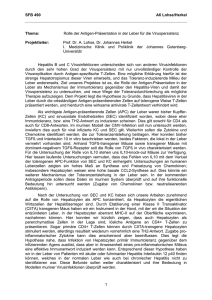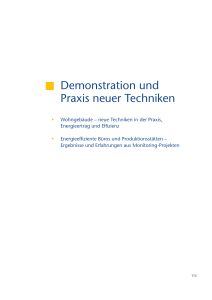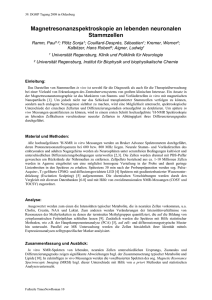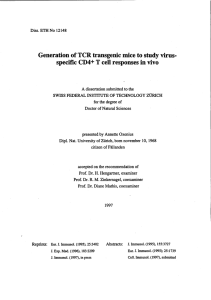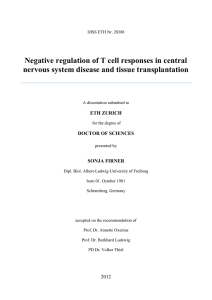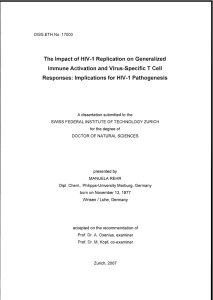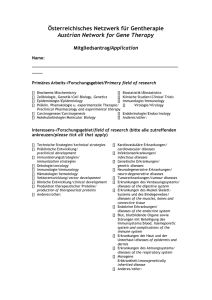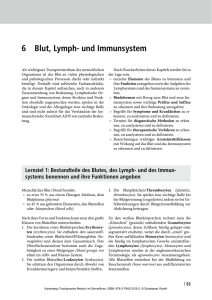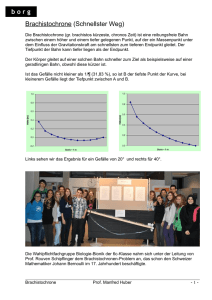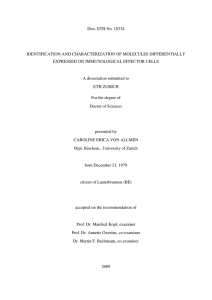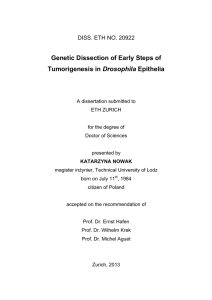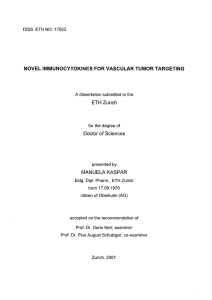Lebenslauf
Werbung
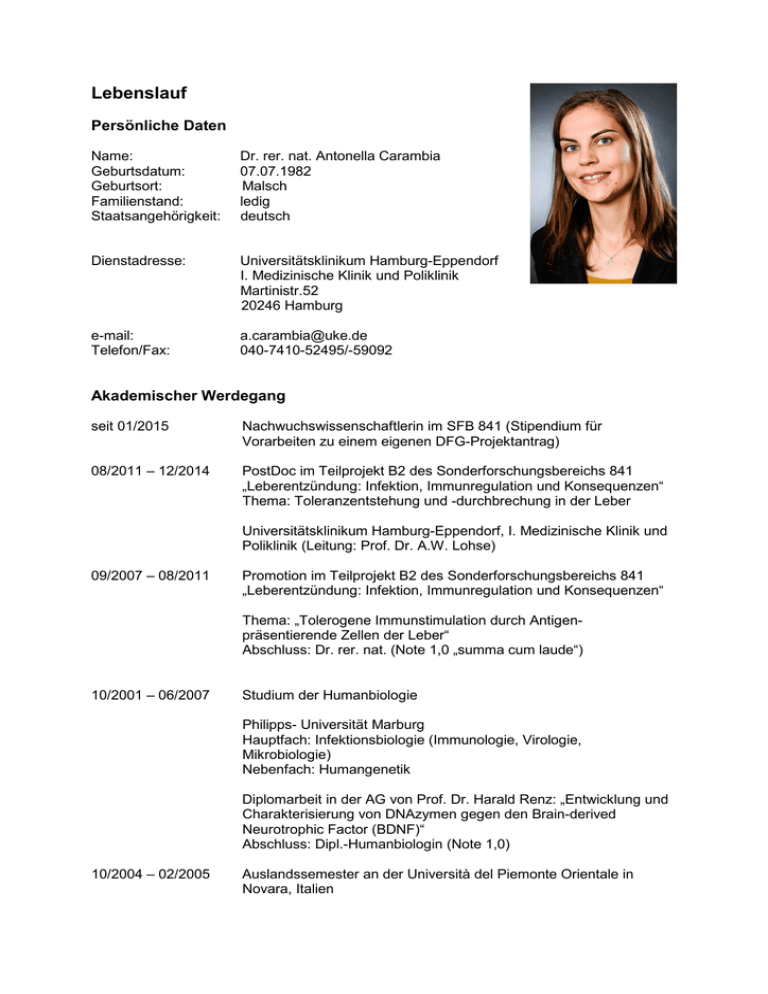
Lebenslauf Persönliche Daten Name: Geburtsdatum: Geburtsort: Familienstand: Staatsangehörigkeit: Dr. rer. nat. Antonella Carambia 07.07.1982 Malsch ledig deutsch Dienstadresse: Universitätsklinikum Hamburg-Eppendorf I. Medizinische Klinik und Poliklinik Martinistr.52 20246 Hamburg e-mail: Telefon/Fax: [email protected] 040-7410-52495/-59092 Akademischer Werdegang seit 01/2015 Nachwuchswissenschaftlerin im SFB 841 (Stipendium für Vorarbeiten zu einem eigenen DFG-Projektantrag) 08/2011 – 12/2014 PostDoc im Teilprojekt B2 des Sonderforschungsbereichs 841 „Leberentzündung: Infektion, Immunregulation und Konsequenzen“ Thema: Toleranzentstehung und -durchbrechung in der Leber Universitätsklinikum Hamburg-Eppendorf, I. Medizinische Klinik und Poliklinik (Leitung: Prof. Dr. A.W. Lohse) 09/2007 – 08/2011 Promotion im Teilprojekt B2 des Sonderforschungsbereichs 841 „Leberentzündung: Infektion, Immunregulation und Konsequenzen“ Thema: „Tolerogene Immunstimulation durch Antigenpräsentierende Zellen der Leber“ Abschluss: Dr. rer. nat. (Note 1,0 „summa cum laude“) 10/2001 – 06/2007 Studium der Humanbiologie Philipps- Universität Marburg Hauptfach: Infektionsbiologie (Immunologie, Virologie, Mikrobiologie) Nebenfach: Humangenetik Diplomarbeit in der AG von Prof. Dr. Harald Renz: „Entwicklung und Charakterisierung von DNAzymen gegen den Brain-derived Neurotrophic Factor (BDNF)“ Abschluss: Dipl.-Humanbiologin (Note 1,0) 10/2004 – 02/2005 Auslandssemester an der Università del Piemonte Orientale in Novara, Italien Schulbildung 06/2001 Abitur am Eichendorff-Gymnasium in Ettlingen (Note 1,2) Auszeichnungen 09/2013 Bursary to young immunologists for ICI, Mailand 09/2012 EFIS travel grant for ECI, Glasgow 04/2010 EASL Young Investigator Bursary 09/2009 EFIS travel grant for ECI, Berlin 01/2009 Stipendium für die EASL Basic School of Hepatology, „Liver Immunology“, Lissabon 10/2004 – 02/2005 ERASMUS Stipendium für Auslandssemester Publikationsliste 1. Schwinge D, Carambia A, Quaas A, Krech T, Wegscheid C, Tiegs G, Prinz I, Lohse AW, Herkel J, Schramm C. Testosterone Suppresses Hepatic Inflammation by the Downregulation of IL-17, CXCL-9, and CXCL-10 in a Mouse Model of Experimental Acute Cholangitis. J Immunol. 2015 Mar 15;194(6):2522-30. doi: 10.4049/jimmunol.1400076. Epub 2015 Feb 11 2. Carambia A, Freund B, Schwinge D, Bruns OT, Salmen SC, Ittrich H, Reimer R, Heine M, Huber S, Waurisch C, Eychmüller A, Wraith DC, Korn T, Nielsen P, Weller H, Schramm C, Lüth S, Lohse AW, Heeren J, Herkel J. Nanoparticle-based autoantigen delivery to Treg-inducing liver sinusoidal endothelial cells enables control of autoimmunity in mice. J Hepatol. 2015 Jan 21. pii: S0168-8278(15)00011-2. doi: 10.1016/j.jhep.2015.01.006. 3. Carambia A, Herkel J. Liver sinusoidal cells collecting MHC-I molecules: you can't get enough of a good thing. J Hepatol. 2014 Sep;61(3):464-5. 4. Carambia A, Freund B, Schwinge D, Heine M, Laschtowitz A, Huber S, Wraith DC, Korn T, Schramm C, Lohse AW, Heeren J, Herkel J. TGF-beta-dependent induction of CD4+CD25+Foxp3+ Tregs by liver sinusoidal endothelial cells. J Hepatol. 2014 Sep;61(3):594-9. 5. Carambia A, Herkel J. Deciphering the highway code of lymphocyte traffic along the gutliver axis. J Hepatol. 2014 Jun;60(6):1110-1. 6. Trautmann T, Kozik JH, Carambia A, Richter K, Lischke T, Schwinge D, Mittrücker HW, Lohse AW, Oxenius A, Wiegard C, Herkel J. CD4+ T-Cell Help Is Required for Effective CD8+ T Cell-Mediated Resolution of Acute Viral Hepatitis in Mice. PLoS One. 2014 Jan 21;9(1):e86348. 7. Carambia A*, Frenzel C*, Bruns OT, Schwinge D, Reimer R, Hohenberg H, Huber S, Tiegs G, Schramm C, Lohse AW, Herkel J. Inhibition of inflammatory CD4 T cell activity by murine liver sinusoidal endothelial cells. J Hepatol. 2013 Jan;58(1):112-8. (*geteilte Erstautorschaft) 8. Carambia A, Herkel J. Th17 cells bound for the liver: group tourists or private travellers? J Hepatol. 2012 Nov;57(5):943-5. 9. Lüth S, Schrader J, Zander S, Carambia A, Buchkremer J, Huber S, Reifenberg K, Yamamura K, Schirmacher P, Lohse AW, Herkel J. Chronic inflammatory IFN-γ signaling suppresses hepatocarcinogenesis in mice by sensitizing hepatocytes for apoptosis. Cancer Res. 2011 Jun 1;71(11):3763-71. 10. Erhardt A, Wegscheid C, Claass B, Carambia A, Herkel J, Mittrücker HW, Panzer U, Tiegs G. CXCR3 deficiency exacerbates liver disease and abrogates tolerance in a mouse model of immune-mediated hepatitis. J Immunol. 2011 May 1;186(9):5284-93. 11. Herkel J, Carambia A. Let it B in viral hepatitis? J Hepatol. 2011 Jul;55(1):5-7. 12. Brundert M, Heeren J, Merkel M, Carambia A, Herkel J, Groitl P, Dobner T, Ramakrishnan R, Moore KJ, Rinninger F.Scavenger receptor CD36 mediatesuptake of high density lipoproteins in mice and by cultured cells. J Lipid Res. 2011 Apr;52(4):74558. 13. Carambia A, Herkel J. CD4 T cells in hepatic immune tolerance. J Autoimmun. 2010 Feb;34(1):23-8. 14. Huber S, Stahl FR, Schrader J, Lüth S, Presser K, Carambia A, Flavell RA, Werner S, Blessing M, Herkel J, Schramm C. Activin a promotes the TGF-beta-induced conversion of CD4+CD25- T cells into Foxp3+ induced regulatory T cells. J Immunol. 2009 Apr 15;182(8):4633-40. Patent EP 2012004735: Nanoparticle compositions for generation of regulatory T cells and treatment of autoimmune diseases and other chronic inflammatory conditions Hamburg, 26.03.2015 Dr. rer. nat. Antonella Carambia
